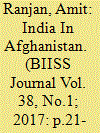| Srl | Item |
| 1 |
ID:
157751


|
|
|
|
|
| Summary/Abstract |
The paper attempts to analyse the prospects of the post-Brexit trade negotiation process. The key factors influencing the negotiation strategies of both the parties, namely the European Union (EU) and the United Kingdom (UK) are discussed in the paper. It also compares the negotiation stances of both the parties and tries to recommend the best possible options for them. The article mainly highlights that both parties’ initial interest-based positions in negotiation could lead to a ‘no deal’ situation that would not be favourable for either the EU or the UK. The paper argues that giving up the positional bargaining and considering multiple phase negotiations on political, socio-economic and trade issues would link mutual interests. This approach would lead both the EU and the UK to go for a meaningful deal that would minimise the negative effects of Brexit.
|
|
|
|
|
|
|
|
|
|
|
|
|
|
|
|
| 2 |
ID:
157747


|
|
|
|
|
| Summary/Abstract |
Bangladesh is widely recognised as one of the most climate-vulnerable countries in the world. Every year the country is exposed to a number of slow and rapid onset disasters that emanate from climate change. Even though some sporadic studies try to estimate the various economic effects of climatic events in Bangladesh, there is a lack of econometric analysis on the linkage between climatic variables and economic growth using its long-term time series data. Given this context, the paper tries to examine the effects of climate change on economic growth of the country using Autoregressive Distributed Lag model for the period 1981-2015. The empirical results reveal that lagged effects of greenhouse gas emission, increased temperature and rainfall have negative with statistically significant effects on the economic growth of Bangladesh.
|
|
|
|
|
|
|
|
|
|
|
|
|
|
|
|
| 3 |
ID:
157750


|
|
|
|
|
| Summary/Abstract |
Globalisation has left tremendous impact in the contemporary world. Despite positive aspects of globalisation in many sectors such as rapid communication, business, enhanced interactions among the peoples, it has also introduced some major changes in the economics, political and military domain of world politics. For example, the rise of China, in terms of economy and military power, is one of the most significant events in the age of globalisation. Despite being a communist state, it liberalised its economy to become one of the largest beneficiaries of globalisation. At the same time, the relative decline of the United States (US) appears to be visible in its economic and political status. This paper takes up the case studies of the US-India Nuclear Agreement and Sino- Pakistan Nuclear Cooperation to demonstrate the political as well as military polarisation of the world and how it is being affected by globalisation. The US and India developed their bilateral political and strategic relationship to a great extent after 9/11. India cooperated with the US in the Global War on Terrorism (GWoT) while the US came forward in signing a nuclear pact with India in 2008. The most common factor seems to be balancing China– the emerging dragon. On the contrary, China and Pakistan enhanced their nuclear cooperation mostly to counterbalance the former. One of their prime objectives is India, a common rival of Pakistan and China, since India – the emerging elephant – is also growing very rapidly, second only to China. Both case studies reveal that the nuclear cooperation and strategic partnerships are triggered by their intentions to safeguard the benefits accrued from globalisation.
|
|
|
|
|
|
|
|
|
|
|
|
|
|
|
|
| 4 |
ID:
157748


|
|
|
|
|
| Summary/Abstract |
Despite the Government of India’s repeated rejections of a demand for having Indian military boots in Afghanistan, there is an ongoing debate across the world, especially within India, over this issue. Whether India’s position secures its strategic interests or not, only future will tell. Historically, Afghanistan is known as a “graveyard of empires” where whosoever interfered has faced destruction — the last one was the erstwhile Soviet Union (1979-1989). At present, the United States (US) and Pakistan are bearing the brunt of their misadventures in 1980s. In this paper, after critically looking into the history and present situation in Afghanistan, the author examines the pitfalls of any form of military engagement by India in Afghanistan.
|
|
|
|
|
|
|
|
|
|
|
|
|
|
|
|